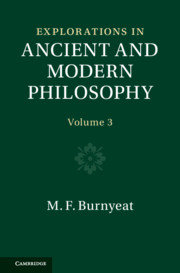Book contents
- Explorations in Ancient and Modern Philosophy
- Explorations in Ancient and Modern Philosophy
- Copyright page
- Contents
- Illustrations
- Preface
- Acknowledgements
- Abbreviations
- Introduction
- Part I The Republic
- Part II The past in the present
- Chapter 9 Plato
- Chapter 10 James Mill on Thomas Taylor’s Plato: Introduction
- Chapter 11 What was ‘the common arrangement’? An Inquiry into John Stuart Mill’s boyhood reading of Plato
- Chapter 12 The past in the present: Plato as educator of nineteenth-century Britain
- Appendix: The archaeology of feeling
- Bibliography
- Index locorum
Chapter 11 - What was ‘the common arrangement’? An Inquiry into John Stuart Mill’s boyhood reading of Plato
from Part II - The past in the present
Published online by Cambridge University Press: 24 March 2022
- Explorations in Ancient and Modern Philosophy
- Explorations in Ancient and Modern Philosophy
- Copyright page
- Contents
- Illustrations
- Preface
- Acknowledgements
- Abbreviations
- Introduction
- Part I The Republic
- Part II The past in the present
- Chapter 9 Plato
- Chapter 10 James Mill on Thomas Taylor’s Plato: Introduction
- Chapter 11 What was ‘the common arrangement’? An Inquiry into John Stuart Mill’s boyhood reading of Plato
- Chapter 12 The past in the present: Plato as educator of nineteenth-century Britain
- Appendix: The archaeology of feeling
- Bibliography
- Index locorum
Summary
In his Autobiography, John Stuart Mill asserts that in 1813 he read ‘the first six dialogues (in the common arrangement) of Plato, from the Euthyphro to the Theaetetus inclusive’ (he was then seven years old; he means the Greek text). What was ‘the common arrangement’? In which edition of the text did Mill encounter it? Indeed, which editions did his father James Mill possess, and which is the one he would have chosen for his son’s introduction to Plato and Platonic Greek? The Thrasyllan arrangement familiar to modern readers from Burnet’s Oxford Text was anything but common or usual in earlier centuries. The only credible candidate is the one pioneered in Serranus’ edition of 1578, printed by Stephanus and then adopted widely, whose pagination has remained the standard Plato reference system. The Stephanus order is found in the complete Bipont Plato edition of 1781-87, whose volumes James Mill gradually acquired. Though it cannot be proved that he possessed in 1813 its opening volumes, containing the dialogues John Stuart read, these are a much likelier choice than the far less readily legible 1602 Frankfurt edition, which he almost certainly owned by that date.
- Type
- Chapter
- Information
- Explorations in Ancient and Modern Philosophy , pp. 272 - 305Publisher: Cambridge University PressPrint publication year: 2022

